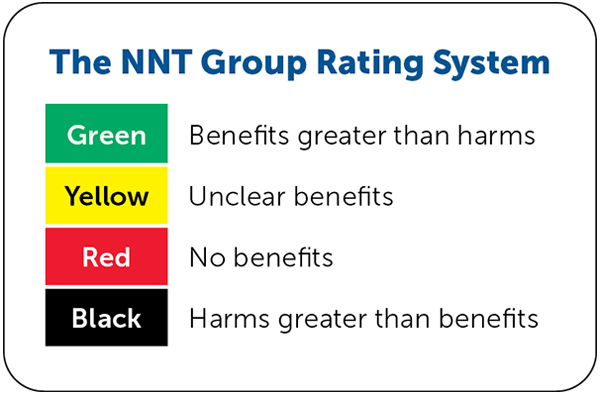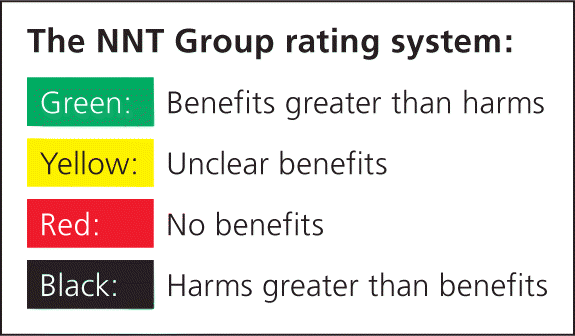
Am Fam Physician. 2016;94(11):877-878
Author disclosure: No relevant financial affiliations.


| Benefits | Harms |
|---|---|
| 1 in 5 avoided relapse compared with placebo | None |
| 1 in 4 avoided antiparkinson medications compared with haloperidol |
Details for This Review
Study Population: Adults with schizophrenia or schizoaffective disorder
Efficacy End Points: Relapse, global state, mental state, leaving the study early, quality of life
Harm End Points: Akathisia, extrapyramidal symptoms, nausea, headache, dyspepsia
Narrative: Antipsychotic drugs are a staple of modern treatment for psychosis-related disorders. Adverse effects from agents such as haloperidol, and a lack of effect on some symptoms, precipitated the development of the ‘atypical’ antipsychotics that have fewer movement problems. Aripiprazole (Abilify) is a relatively recent addition, approved by the U.S. Food and Drug Administration (FDA) for a broad array of conditions including schizophrenia, mania, depression, autism, agitation, and tic disorders. This review focused on the effects of aripiprazole compared with placebo or other typical antipsychotics such as haloperidol in patients with schizophrenia.
Fifteen studies with 7,110 patients were included, nine of which compared aripiprazole with placebo and six that compared aripiprazole with haloperidol.1 In one study, aripiprazole resulted in less relapse compared with placebo (number needed to treat [NNT] = 5, 95% confidence interval [CI], 4 to 8). In eight of the studies, aripiprazole produced better compliance with study protocol (NNT = 26, 95% CI, 16 to 239). Compared with haloperidol, aripiprazole was similar for most outcomes, but caused less akathisia (NNT = 20, 95% CI, 17 to 32) and less need for antiparkinson medication (NNT = 4, 95% CI, 3 to 5).
This review addresses only the question of aripiprazole compared with placebo or haloperidol. A separate Cochrane review examined 174 trials with more than 17,000 patients, finding no evidence of meaningful benefits or harms with aripiprazole when compared with agents in the same class (atypical antipsychotics).2
Caveats: Despite 7,110 patients in 15 trials, there were no data pertaining to many important outcomes, including death, general function, behavior, satisfaction, economic outcomes, or cognitive function. Study attrition was high (typically 30% or higher), and data reporting was mostly poor.
The one major benefit of aripiprazole over placebo was decreased relapse in a single study of 310 patients. Moreover, a nearly significant difference favored haloperidol over aripiprazole for “global state,” defined by deterioration, psychosis, or lack of effectiveness. The benefit of not requiring antiparkinson medications was noted in a number of moderate- to low-quality studies, and seems potentially important. The differences in these comparisons seem tenuous with small numbers and low quality, and dozens more comparisons not shown here demonstrated no differences, raising the question of whether the few differences may be anomalies. Therefore, we have classified aripiprazole for the treatment of schizophrenia as yellow.
The FDA has issued three warnings related to aripiprazole. As with all antidepressants, aripiprazole may be associated with increased suicidality in those younger than 25 years.3 Compared with other atypical antipsychotics, an increase in deaths is reported when using aripiprazole to treat behavior problems in older patients with dementia.4 Finally, there have been multiple reports to the FDA of dangerous impulse control problems including gambling, eating, shopping, and sexual behavior associated with aripiprazole use.5
This series is coordinated by Dean A. Seehusen, MD, MPH, AFP Contributing Editor, and Daniel Runde, MD, from the NNT Group (theNNT.com).
A collection of Medicine by the Numbers published in AFP is available at https://www.aafp.org/afp/mbtn.
This review is available from the NNT Group at http://www.thennt.com/nnt/aripiprazole-vs-placebo-haloperidol-schizophrenia/.
